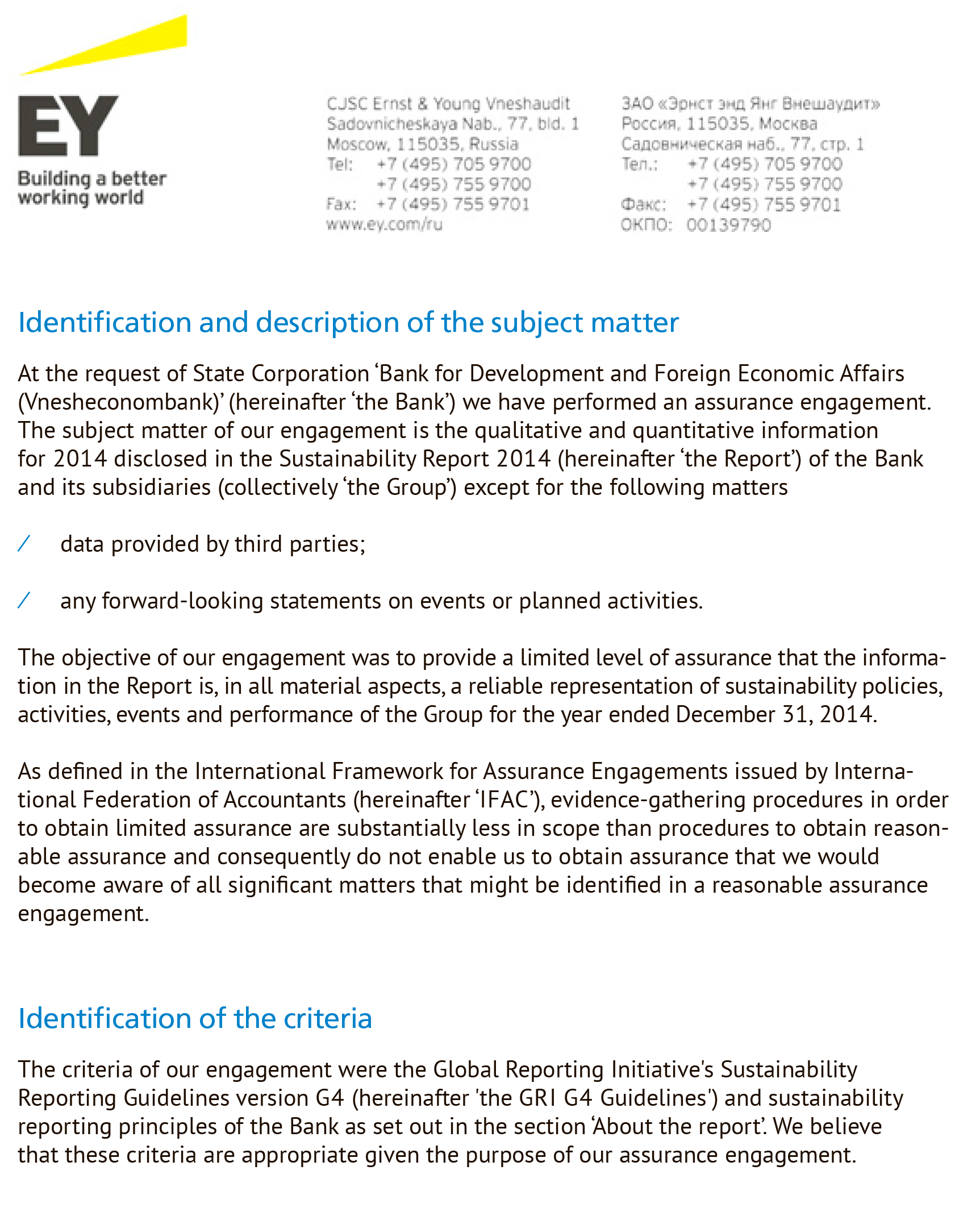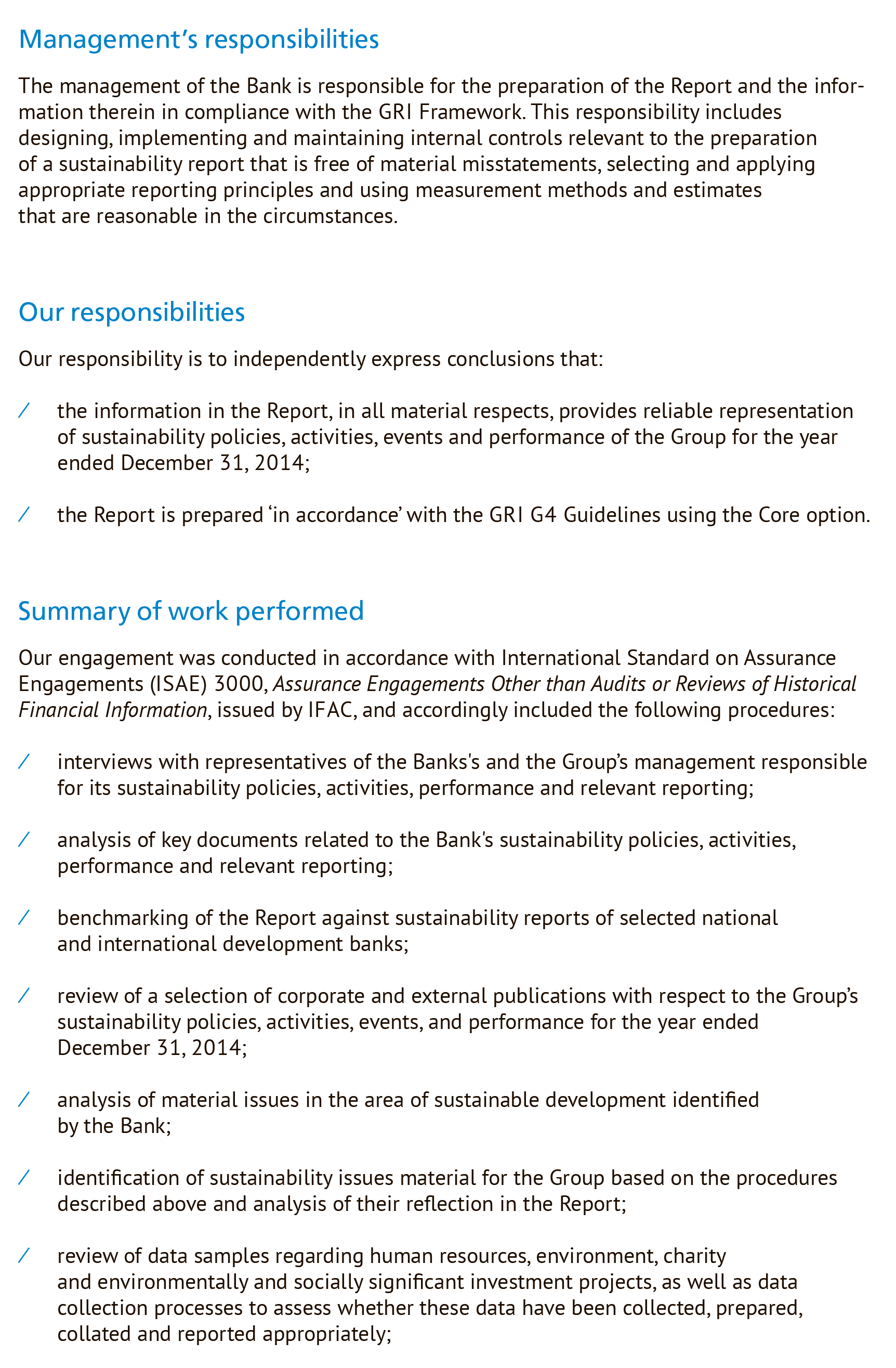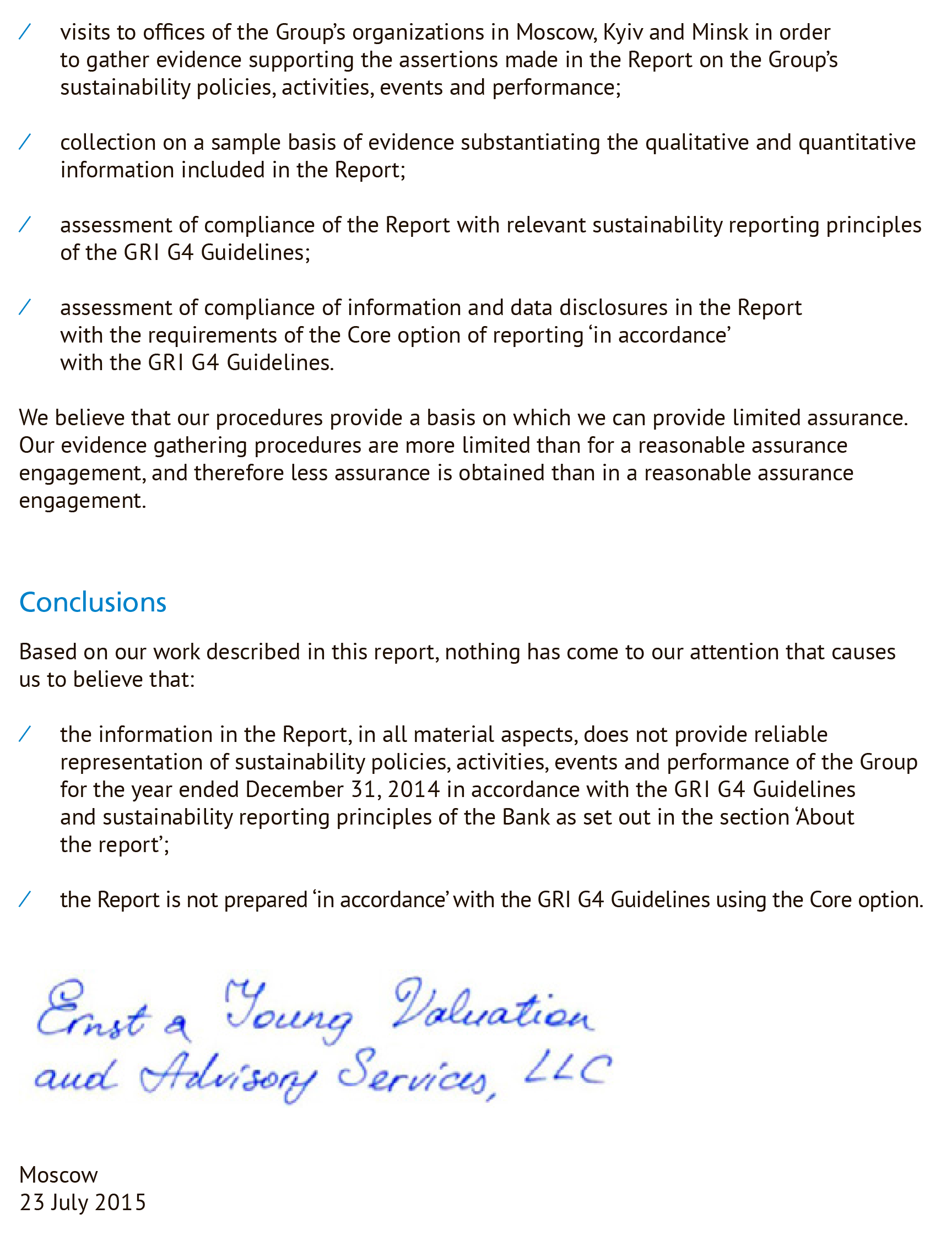|
GRI G4 disclosures |
UN Global Compact’s Principles |
Section of the Report/Comments |
|||
|---|---|---|---|---|---|
|
General Standard Disclosures |
|||||
|
Strategy and Analysis |
|||||
|
G4-1 |
Statement from the most senior decision-maker of the organisation |
√ |
|||
|
G4-2 |
Description of key impacts, risks, and opportunities |
Principles |
√ |
||
|
Organisational profile |
|||||
|
G4-3 |
Name of the organisation |
√ |
|||
|
G4-4 |
Primary brands, products and/or services |
√ |
|||
|
G4-5 |
Location of organisation’s headquarters |
√ |
|||
|
G4-6 |
Number of countries where the organisation operates |
√ |
|||
|
G4-7 |
Nature of ownership and legal form |
√ |
|||
|
G4-8 |
Markets served |
√ |
|||
|
G4-9 |
Scale of the reporting organisation |
Development of Economic Potential Improving the Investment Climate |
√ |
||
|
G4-10 |
Total number of employees by employment contract, staff and non-staff workforce, gender, employment type, etc. |
Principle 6. Businesses should uphold the elimination of discrimination in respect of employment and occupation |
√ |
||
|
G4-11 |
Percentage of total employees covered by collective bargaining agreements |
Principle 1. Businesses should support and respect the protection of internationally proclaimed human rights Principle 3. Businesses should uphold the freedom of association and the effective recognition of the right to collective bargaining |
As of 31 December 2014, collective bargaining agreements were made with all employees of BelVEB and Prominvestbank, while 51% of Vnesheconombank’s employees were trade union members |
√ |
|
|
G4-12 |
Supply chain |
Principle 10. Businesses should work against corruption in all forms, including extortion and bribery |
√ |
||
|
G4-13 |
Significant changes during the reporting period regarding size, structure, or ownership or supply chain |
No significant changes regarding size, structure or ownership were detected in Vnesheconombank and the Group’s entities in 2014 |
√ |
||
|
G4-14 |
Precautionary principle |
Principle 7. Businesses should support a precautionary approach to environmental challenges |
The risk management approach described in detail in annual statements for 2014 and the issuer’s reports http://www.veb.ru/en/ifi/rep/annual/ |
√ |
|
|
G4-15 |
Externally developed economic, environmental and social charters, principles or other initiatives to which the organisation subscribes or which it endorses |
√ |
|||
|
G4-16 |
Memberships of associations and/or national or international advocacy organisations |
√ |
|||
|
Identified Material Aspects and Boundaries |
|||||
|
G4-17 |
All entities included in the organisation’s consolidated financial statements |
√ |
|||
|
G4-18 |
The process for defining the report content and the Aspect Boundaries |
√ |
|||
|
G4-19 |
List of all the material Aspects identified in the process for defining report content |
√ |
|||
|
G4-20 |
Description of the Aspect Boundary within the organisation for each material Aspect |
Disclosed topics are material for all entities of Vnesheconombank Group unless otherwise specified. Calculations for Energy, Water, Emissions and Effluents and Waste Aspects are based on large offices owned and rented by Group’s entities. Small leased offices with the rental calculated without a breakdown into the cost of resource consumption, waste disposal, etc., were not accounted |
√ |
||
|
G4-21 |
Description of the Aspect Boundary outside the organisation for each material Aspect |
Disclosed topics are immaterial outside Vnesheconombank Group unless otherwise specified |
√ |
||
|
G4-22 |
The effect of any restatements of information provided in previous reports and the reasons for such restatements |
There are no restatements of information provided in the VEB Group’s Sustainability Report 2013 |
√ |
||
|
G4-23 |
Significant changes from previous reporting periods in the Scope and Aspect Boundaries |
√ |
|||
|
Stakeholder Engagement |
|||||
|
G4-24 |
List of stakeholders |
√ |
|||
|
G4-25 |
Basis for identification and selection of stakeholders with whom to engage |
√ |
|||
|
G4-26 |
Approach to stakeholder engagement |
√ |
|||
|
G4-27 |
Key topics and concerns that have been raised through stakeholder engagement |
√ |
|||
|
Report Profile |
|||||
|
G4-28 |
Reporting period |
|
√ |
||
|
G4-29 |
Date of most recent previous sustainability report |
The VEB Group’s Sustainability Report 2013 was published in 2014 |
√ |
||
|
G4-30 |
Reporting cycle |
Vnesheconombank Group publishes its sustainability reports on an annual basis |
√ |
||
|
G4-31 |
Contact point for questions regarding the report or its contents |
√ |
|||
|
G4-32 |
GRI Content Index |
√ |
|||
|
G4-33 |
Assurance |
√ |
|||
|
Governance |
|||||
|
G4-34 |
Governance structure of the organisation, including committees of the highest governance body |
√ |
|||
|
Ethics and Integrity |
|||||
|
G4-56 |
Organisation’s values, principles, standards and norms of behaviour such as codes of conduct and codes of ethics |
Principle 1. Businesses should support and respect the protection of internationally proclaimed human rights Principle 2. Businesses should make sure that they are not complicit in human rights abuses Principle 6. Businesses should uphold the elimination of discrimination in respect of employment and occupation Principle 10. Businesses should work against corruption in all forms, including extortion and bribery |
Responsible Business Practices In Vnesheconombank and most entities of the Group, principles, standards and norms of behaviour are governed by regulatory documents (codes of corporate conduct, codes of ethics and corporate standards, etc.). Employees are trained in business conduct during an onboard course. Some entities of the Group also have in place a relevant online training course |
√ |
|
|
Specific Standard Discolsures |
|||||
|
EC |
Economic |
||||
|
EC-DMA |
Disclosures on management approach |
Principle 10. Businesses should work against corruption in all forms, including extortion and bribery |
√ |
||
|
G4-EC1 |
Direct economic value generated and distributed |
Principle 10. Businesses should work against corruption in all forms, including extortion and bribery |
Annual reports of Vnesheconombank Group’s entities published on their official websites |
√ |
|
|
G4-EC3 |
Coverage of the organisation’s defined benefit plan obligations |
Principle 6. Businesses should uphold the elimination of discrimination in respect of employment and occupation |
√ |
||
|
G4-EC4 |
Financial assistance received from government |
Principle 10. Businesses should work against corruption in all forms, including extortion and bribery |
√ |
||
|
G4-EC5 |
Ratios of standard entry level wage by gender compared to local minimum wage at significant locations of operation |
Principle 1. Businesses should support and respect the protection of internationally proclaimed human rights Principle 6. Businesses should uphold the elimination of discrimination in respect of employment and occupation |
Salary in Vnesheconombank and the Group’s entities is not conditional upon an employee’s gender. In the Report, the breakdown by country (Russia, Belarus, Ukraine) is used as a breakdown by significant locations of operation of Vnesheconombank Group |
√ |
|
|
G4-EC7 |
Development and impact of infrastructure investments and services supported |
Principle 10. Businesses should work against corruption in all forms, including extortion and bribery |
Strategic Development Priorities Development of Economic Potential |
√ |
|
|
G4-EC8 |
Significant indirect economic impacts, including the extent of impacts |
Principle 10. Businesses should work against corruption in all forms, including extortion and bribery |
Strategic Development Priorities Development of Economic Potential |
√ |
|
|
ЕN |
Environmental |
||||
|
EN-DMA |
Disclosures on management approach |
Principle 7. Businesses should support a precautionary approach to environmental challenges Principle 8. Businesses should undertake initiatives to promote greater environmental responsibility Principle 9. Businesses should encourage the development and diffusion of environmentally friendly technologies |
√ |
||
|
G4-EN1 |
Materials used by weight or volume |
Principle 7. Businesses should support a precautionary approach to environmental challenges Principle 8. Businesses should undertake initiatives to promote greater environmental responsibility Principle 9. Businesses should encourage the development and diffusion of environmentally friendly technologies |
√ |
||
|
G4-EN3 |
Energy consumption within the organisation |
Principle 8. Businesses should undertake initiatives to promote greater environmental responsibility |
Under the GRI guidelines, quantitative data were converted from kW-h and Gcal into GJ using 0.0036 and 4.1868 ratios, respectively |
√ |
|
|
G4-EN6 |
Reduction of energy consumption |
Principle 8. Businesses should undertake initiatives to promote greater environmental responsibility |
In 2014, total consumption of electricity across Vnesheconombank Group was reduced by 35% and constituted 143,449 GJ |
√ |
|
|
G4-EN8 |
Total water withdrawal by source |
Principle 8. Businesses should undertake initiatives to promote greater environmental responsibility |
In 2014, water consumption across Vnesheconombank Group was reduced by 44% and constituted 183,904 cubic metre |
√ |
|
|
G4-EN15 |
Direct greenhouse gas emissions |
Principle 7. Businesses should support a precautionary approach to environmental challenges Principle 8. Businesses should undertake initiatives to promote greater environmental responsibility Principle 9. Businesses should encourage the development and diffusion of environmentally friendly technologies |
CO2 equivalent emissions in relation to electricity consumption and CO2 equivalent emissions in relation to usage of corporate cars were assessed in line with procedures of European Bank for Reconstruction and Development and guidelines ‘Safeguarding the Ozone Layer and the Global Climate System: Issues Related to Hydrofluorocarbons and Perfluorocarbons’, respectively |
√ |
|
|
G4-EN23 |
Total weight of waste by type and disposal method |
Principle 7. Businesses should support a precautionary approach to environmental challenges Principle 8. Businesses should undertake initiatives to promote greater environmental responsibility Principle 9. Businesses should encourage the development and diffusion of environmentally friendly technologies |
In 2014, municipal solid wastes sent by Vnesheconombank Group to landfills were increased by 12% and reached 2,748 tonnes |
√ |
|
|
G4-EN29 |
Monetary value of significant fines and total number of non-monetary sanctions for non-compliance with environmental laws and regulations |
Principle 8. Businesses should undertake initiatives to promote greater environmental responsibility |
In 2014, neither Vnesheconombank, nor the Group’s entities were liable to any significant fines or non-monetary sanctions for non-compliance with environmental laws and regulations |
√ |
|
|
G4-EN30 |
Significant environmental impacts of transporting products and other goods and materials for the organisation’s operations, and transporting members of the workforce |
Principle 7. Businesses should support a precautionary approach to environmental challenges Principle 8. Businesses should undertake initiatives to promote greater environmental responsibility Principle 9. Businesses should encourage the development and diffusion of environmentally friendly technologies |
√ |
||
|
G4-EN31 |
Total environmental protection expenditures and investments |
Principle 7. Businesses should support a precautionary approach to environmental challenges Principle 8. Businesses should undertake initiatives to promote greater environmental responsibility Principle 9. Businesses should encourage the development and diffusion of environmentally friendly technologies |
√ |
||
|
LA |
Social Labour Practices and Decent Work |
||||
|
LA-DMA |
Disclosures on management approach |
Principles |
√ |
||
|
G4-LA1 |
Total number and rates of new employee hires and employee turnover by age group, gender and region |
Principle 6. Businesses should uphold the elimination of discrimination in respect of employment and occupation |
√ |
||
|
G4-LA2 |
Benefits provided to full-time employees that are not provided to temporary or part-time employees, by significant locations of operation |
Principle 6. Businesses should uphold the elimination of discrimination in respect of employment and occupation |
Social benefits are offered by Vnesheconombank Group to all staff employees after the probation period |
√ |
|
|
G4-LA3 |
Return to work and retention rates after parental leave, by gender |
Principle 6. Businesses should uphold the elimination of discrimination in respect of employment and occupation |
√ |
||
|
G4-LA4 |
Minimum notice periods regarding operational changes, including whether these are specified in collective agreements |
Principle 1. Businesses should support and respect the protection of internationally proclaimed human rights Principle 3. Businesses should uphold the freedom of association and the effective recognition of the right to collective bargaining Principle 6. Businesses should uphold the elimination of discrimination in respect of employment and occupation |
In line with the Russian Labour Code, the notice period in Vnesheconombank and the Group’s entities operating in Russia is 2 weeks. In BelVEB and Prominvestbank, the notice period provision is included in collective bargaining agreements |
√ |
|
|
G4-LA6 |
Type of injury and rates of injury, occupational diseases, lost days, and absenteeism, and total number of work-related fatalities, by region and by gender |
Principle 1. Businesses should support and respect the protection of internationally proclaimed human rights |
In its relations with independent contractors, Vnesheconombank and the Group’s entities are not liable for health and safety of the contractor’s personnel in the work place |
√ |
|
|
G4-LA9 |
Average hours of training per year per employee by gender and by employee category |
Principle 6. Businesses should uphold the elimination of discrimination in respect of employment and occupation |
Prominvestbank calculates average hours of training per year based on the duration of standard trainings and number of employees subject to these trainings |
√ |
|
|
G4-LA10 |
Programmes for skills management and lifelong learning that support the continued employability employees and assist them in managing career endings |
Principle 6. Businesses should uphold the elimination of discrimination in respect of employment and occupation |
√ |
||
|
G4-LA11 |
Percentage of employees receiving regular performance and career development reviews, by gender and by employee category |
Principle 2. Businesses should make sure that they are not complicit in human rights abuses Principle 6. Businesses should uphold the elimination of discrimination in respect of employment and occupation |
√ |
||
|
G4-LA16 |
Number of grievances about labour practices filed, addressed and resolved through formal grievance mechanisms |
Principle 1. Businesses should support and respect the protection of internationally proclaimed human rights Principle 2. Businesses should make sure that they are not complicit in human rights abuses Principle 6. Businesses should uphold the elimination of discrimination in respect of employment and occupation Principle 10. Businesses should work against corruption in all forms, including extortion and bribery |
In 2014, 6 grievances about labour practices were filed by employees of VEB-Leasing and Sviaz-Bank. All grievances were reviewed and resolved in line with Russian labour laws |
√ |
|
|
HR |
Human Rights |
||||
|
HR-DMA |
Disclosures on management approach |
Principles |
√ |
||
|
G4-HR3 |
Total number of incidents of discrimination and corrective actions taken |
Principles 1, 2, 6 |
All employees of Vnesheconombank Group are guaranteed equal rights and opportunities regardless of their gender, religious and political beliefs, ethnic origin and age. In 2014, no cases of discrimination were identified in Vnesheconombank Group |
√ |
|
|
G4-HR12 |
Number of grievances about human rights impacts filed, addressed and resolved through formal grievance mechanisms |
Principles 1, 2, 6, 10 |
In 2014, one grievance about violation of human rights of disabled employees was filed with Sviaz-Bank. The grievance was reviewed, and the organisation took all necessary measures to address the identified breaches |
√ |
|
|
SO |
Society |
||||
|
SO-DMA |
Disclosures on management approach |
Principle 1. Businesses should support and respect the protection of internationally proclaimed human rights Principle 2. Businesses should make sure that they are not complicit in human rights abuses |
√ |
||
|
G4-SO1 |
Percentage of operations with implemented local community engagement, impact assessments and development programmes |
Principle 1. Businesses should support and respect the protection of internationally proclaimed human rights Principle 2. Businesses should make sure that they are not complicit in human rights abuses |
Projects for Regional Development and Modernisation of Single-Industry Towns |
√ |
|
|
G4-SO3 |
Total number and percentage of operations assessed for risks related to corruption and the significant risks identified |
Principle 10. Businesses should work against corruption in all forms, including extortion and bribery |
Responsible Business Practices In 2014, the Group ran a comprehensive analysis of corruption risks in 77 business units of Vnesheconombank, BelVEB, RDIF and the Far East and Baikal Region Development Fund, or 75% of the total number of business units in these entities |
√ |
|
|
G4-SO4 |
Communication and training on anti-corruption policies and procedures |
Principle 10. Businesses should work against corruption in all forms, including extortion and bribery |
Responsible Business Practices Vnesheconombank Group does not train business partners on anti-corruption policies and procedures |
√ |
|
|
G4-SO5 |
Confirmed incidents of corruption and actions taken |
Principle 10. Businesses should work against corruption in all forms, including extortion and bribery |
No confirmed incidents of corruption were identified in Vnesheconombank and the Group’s entities in 2014 |
√ |
|
|
G4-SO8 |
Monetary value of significant fines and total number of non-monetary sanctions for non-compliance with laws and regulations |
Principle 1. Businesses should support and respect the protection of internationally proclaimed human rights Principle 2. Businesses should make sure that they are not complicit in human rights abuses Principle 10. Businesses should work against corruption in all forms, including extortion and bribery |
In 2014, significant fines were imposed on Prominvestbank (RUB 13.25 mn) and Sviaz-Bank (RUB 2.24 mn). The relevant breaches were related to non-compliance with labour laws and non-payments to tax authorities and the Social Security Fund. The fines were paid, and the entities took all necessary steps to address the breaches. No non-financial sanctions regarding Vnesheconombank Group were identified in 2014 |
√ |
|
|
G4-SO11 |
Number of grievances about impacts on society filed, addressed and resolved through formal grievance mechanisms |
Principle 1. Businesses should support and respect the protection of internationally proclaimed human rights Principle 2. Businesses should make sure that they are not complicit in human rights abuses Principle 10. Businesses should work against corruption in all forms, including extortion and bribery |
No grievances about projects financed by Vnesheconombank Group were filed by local residents in 2014 |
√ |
|
|
PR |
Product Responsibility |
||||
|
PR-DMA |
Disclosures on management approach |
Principle 1. Businesses should support and respect the protection of internationally proclaimed human rights Principle 2. Businesses should make sure that they are not complicit in human rights abuses Principle 10. Businesses should work against corruption in all forms, including extortion and bribery |
√ |
||
|
G4-PR5 |
Results of surveys measuring customer satisfaction |
Principle 1. Businesses should support and respect the protection of internationally proclaimed human rights Principle 2. Businesses should make sure that they are not complicit in human rights abuses |
√ |
||
|
FS |
Financial Services Sector Supplement |
||||
|
FS-DMA |
Disclosures on management approach |
Principles 1, 2, 6-9 |
Strategic Development Priorities Developing HR Potential in the Investment Market In 2014, 21 employees of Vnesheconombank and 76 employees of BelVEB completed a specialised training course on management of social and/or environmental risks and responsible financing. In 2014, Globexbank ran an audit of compliance with environmental and social requirements involving experts from a third-party consultancy |
√ |
|
|
G4-FS6 |
Percentage of the portfolio for business lines by specific region, size (e.g. micro/SME/large) and by sector |
√ |
|||
|
G4-FS7 |
Monetary value of products and services designed to deliver a specific social benefit for each business line broken down by purpose |
Development of Economic Potential |
√ |
||
|
G4-FS8 |
Monetary value of products and services designed to deliver a specific environmental benefit for each business line broken down by purpose |
Principle 8. Businesses should undertake initiatives to promote greater environmental responsibility |
√ |
||
- My Reports (empty)
- Add to my reports
- Print version
- Download in PDF
- Browsing history
- Interactive analysis
- Feedback
- Company in soc.networks




